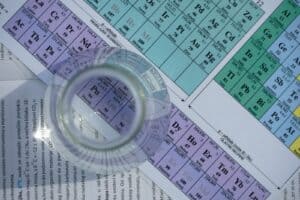Navigating the world of GED Science Test preparation can be a daunting task, but with the right resources and strategies, you’ll find yourself well-equipped to conquer the exam. The GED Science Test is one of four subtests that make up the General Educational Development (GED) exam, which measures your knowledge and skills in key subject areas equivalent to a high school education.
Preparing for the GED Science Test involves familiarizing yourself with the three main content domains: Life Science, Physical Science, and Earth and Space Science. You can access GED Science Practice Test materials, including free options, and seek guidance from the official GED Testing Service to help you master the test. These practice tests cover essential science concepts ranging from biology and physics to earth’s systems and chemical properties.
By dedicating adequate study time to each content domain, you’ll gain a solid understanding of how to interpret scientific data, design science experiments, and answer various types of test questions from multiple-choice to fill-in-the-blank. By focusing on your weaker areas and maintaining a consistent practice schedule, you’ll increase your chances of achieving a passing score on test day.
Understanding the GED Science Test

Are you preparing for the GED science test? It’s essential to understand the key concepts and subjects covered on the exam, as well as the types of questions you’ll encounter. This guide will give you an overview of what to expect from the GED science test and how to get the most out of your study time.
The GED science test is one of four subject areas on the GED exam, which also includes math, social studies, and language arts. This test focuses on three main content areas: life science, physical science, and earth and space science. These subjects cover topics such as ecology, human health, living things, and Earth’s systems. The GED science test consists of 34-40 multiple-choice and fill-in-the-blank questions, and you’ll have up to 90 minutes to complete it.
To get started, try taking a GED science practice test or utilizing GED science practice tests online. These practice tests will help you become familiar with the types of questions on the exam and gauge your current knowledge in the subject. Moreover, the GED testing service offers a range of study materials and resources to help you prepare for the GED science exam.
Some key topics you’ll need to master for the GED science test include:
- Reading and interpreting scientific data
- Understanding chemical equations and properties
- Basics of the human body and health
- Earth’s orbit, rotation, and relationship to other celestial bodies
- Fundamentals of physics, such as motion, force, and energy
- Concepts of biology, evolution, and ecology
It’s crucial to spend ample time preparing for the GED science test by reviewing these topics and practicing your test-taking skills. To excel in interpreting science experiments, make sure to analyze various data presentations and practice drawing conclusions from them. As you work through practice tests, be sure to also identify any weaknesses in your knowledge and focus on improving those areas.
When you take the GED science exam on test day, keep in mind that a passing score is between 145-164. To ensure you’re well-prepared for the test, you’ll want to review multiple-choice strategies and become familiar with the types of question formats, such as drop-down, hot spot, and fill in the blank.
Breaking Down the Test Sections

Preparing for the GED science test can be daunting, but understanding the different sections and what to expect can help ease your concerns. The GED science exam contains three main subject areas, and knowing what to focus on is essential for success.
- Life Science: Covering around 40% of the test, this subject explores living things, biology, health, and evolution. Some topics you might encounter in the life science section include the human body, food, and living organisms.
- Physical Science: Comprising approximately another 40% of the science test, this subject focuses on chemistry and physics. Chemical properties, equations, and reactions, alongside concepts like force, motion, and energy, can be expected in this section.
- Earth and Space Science: The remaining 20% of the GED science exam deals with topics related to Earth’s systems and space. This area delves into subjects like weather, geology, astronomy, and the vast array of celestial bodies.
| Subject | Percentage | Possible Topics |
| Life Science | 40% | Biology, Health |
| Physical Science | 40% | Physics, Chemistry |
| Earth/Space | 20% | Geology, Astronomy |
The GED science test consists of around 35 multiple-choice questions and usually includes at least one short answer question. In addition to traditional multiple choice and fill in the blank questions, alternate question types like drop-down, drag-and-drop, and hot spot items might also appear.
It’s important to note that the passing score for the science portion is 145 out of a possible 200 points. To achieve this, you must be able to:
- Interpret and apply science concepts
- Understand and utilize data from science experiments
- Demonstrate the ability to reason scientifically
To prepare for the GED science test, consider taking practice tests specially designed for this subject area. GED science practice tests are available through various sources such as GED Testing Service LLC and other test prep websites.
Familiarizing yourself with the types of questions and topics covered, plus how to interpret scientific data and experiments, can help ensure a stronger performance on test day. As you review your practice test results, note any areas that might need more focus or study time.
In conclusion, understanding the sections and structure of the GED science test, along with dedicating time to GED science practice, will increase your confidence and knowledge as you get closer to walking into your testing center. So grab those study materials, tackle those practice questions, and give yourself the best possible shot at success on the GED science exam!
Helpful Study Techniques and Resources

When preparing for the GED Science test, it’s essential to know what to expect and use effective study techniques and resources. This test covers life science, physical science, earth, and space science topics. To increase your chances of success, make sure you’re familiar with scientific data interpretation, designing and interpreting science experiments, and various science concepts.
A great place to start is by taking GED Science practice tests. These practice tests will help you determine your strengths and weaknesses, and give you a feel for the types of questions you’ll face on the actual exam. GED Testing Service LLC offers a variety of free and paid resources, including practice tests, sample questions, and review materials. Some other notable sources for GED Science practice tests include:
- Kaplan Test Prep
- REA’s GED Test Prep
- McGraw Hill Education
When studying for the GED Science exam, it’s crucial to dedicate ample time to reviewing the following subjects:
- Life Science: Biology, evolution, human body, and living things
- Physical Science: Physics, Chemistry, chemical properties, and chemical equations
- Earth Science: Earth’s Systems, geology, and environmental science
- Space science: Astronomy, solar system, and space exploration
To maximize your study time, make sure to utilize a variety of resources, such as textbooks, online tutorials, and educational videos that cover essential science concepts. In addition, practice questions will help you get familiar with the multiple-choice, fill-in-the-blank, drop-down, and hot-spot question formats. Moreover, the GED Science test may require you to perform short-answer tasks that involve data analysis and interpretation.
As you study, focus on understanding the rationale behind correct answers, rather than merely memorizing them. By comprehending the reasoning, you’ll build the problem-solving skills necessary for the GED test. Remember, the science portion of the GED requires a passing score of 145 out of 200, so aim for consistent improvement.
Lastly, if possible, find a study group or engage with friends who are also preparing for the GED Science test. Collaborative study sessions can help reinforce your understanding and provide different perspectives on challenging topics.
Conclusion
In your journey to conquering the GED science test, adequate preparation is key. With a variety of GED science practice tests available, you have a great way to hone your skills and understanding of the material. Strengthening your command of life science, physical science, space science, and earth’s systems, among other subjects, is crucial for performing well on the exam.
Make sure to take advantage of the various tools offered by GED Testing Services LLC to help familiarize yourself with what to expect on test day. Preparing with GED science practice tests not only allows you to gauge your knowledge but also to identify areas where you might need more practice. Keep these preparation tips in mind:
- Focus on learning key science concepts and interpreting scientific data
- Try as many practice tests as possible, and review your answers meticulously
- Set aside regular study time for efficient preparation
Ultimately, thorough preparation and diligent study habits are the keys to your success on the GED science exam. By making use of high-quality GED practice materials and pushing yourself to master the required subjects, you’ll be well on your way to conquering the test and opening doors to greater educational and career opportunities. So, roll up your sleeves and delve right into the fascinating world of science, forging your path towards GED success!
